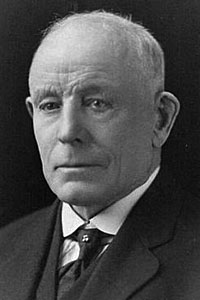Roderick McKenzie was born in 1849 in Ashfield Twp., Huron County Ontario. He was the second born child , and first born son of Colin and Ann MacKenzie of Strathconnon, Ross-shire, Scotland, who emigrated to Canada in 1842 and homesteaded near Kintail in Ashfield Twp., just north of Goderich. Roderick was raised on the family homestead, attended local schools and completed his education in Goderich, Ontario. As a young man he taught school and in 1877, at the age of 28 years he left Ashfield Twp., to seek a new life in the west. Before leaving Ashfield in 1875 he married Janet McDonald., They eventually had a family of four sons, Colin, Hugh, and twins, Donald and Lorne.
Following his first career in the west as a railroad bridge and road contractor, he returned to farming in 1893. In 1897 he took up a homestead, (Sec. 19 – 11 – 18 w) six miles north of Brandon in the Forrest district where he and his sons farmed for many year. Roderick became very much aware of the problems farmers faced in the marketing of their produce and observed through first hand experience how they were often taken advantage of by the grain trade. He soon became a champion of the farmer’s cause and dedicated his life to that issue as the pioneer of the movement to organize farm people to better express their needs and aspirations. 1903-1916 Roderick became the first provincial secretary-treasurer of the Manitoba Grain Growers Association, which later became the United Farmers of Manitoba. In 1908 he was appointed editor of the Grain Growers Guide, the voice of organized farmers and their provincial associations, which subsequently became The Country Guide. In addition, for the eight years from 1909-1917 Roderick was director of the Grain Growers Grain Co. Also in1917-1922 he was secretary of the Canadian Council of Agriculture, became it’s vice-president in 1918 a position in which he served 1922. As well in 1917 at the amalgamation of Alberta Farmer’s Co-operative Elevator Co. and the Grain Growers Grain Co., Roderick was elected a founding director of the resulting United Grain Growers Company Limited a farmer owned co-operative. He continued in that capacity, in addition to his other responsibilities, until 1921. Over the years from 1893 to 1922, Roderick McKenzie, having learned first hand the problems facing the western farmer, fought their cause at every level. He spoke on many occasions across Canada, from the Maritime Provinces to British Columbia, showing farmers how to organize, an encouraging them to seek a fairer pricing and marketing system for their products, spoke on agricultural policy to Sir Wilfred Laurier (Prime Minister) and was often consulted by Sir Robert Borden (Prime Minister) on matters relating to Canadian agriculture.
In local community service, beginning in 1894 Roderick served as a director of the Brandon Fair for several years. He served many years as an elder in he Presbyterian Church and was a renowned Sunday School teacher in both Brandon and Winnipeg.
Following the death of his first wife in 1913, Roderick moved to Winnipeg to better fulfill the responsibilities of his various positions. In 1916 he married his second wife, Elizabeth and they had two daughters, Elizabeth and Ada. At the time of his death in 1925, the Winnipeg Free Press, January 27 1925 described him as “an outstanding figure in the organized farming movement.
He was the most active and most intimate spirit in the grain growers’ organized movement, the leader to whom the great mass of the farmers looked for advice and on whom the executive leaned in times of stress. He was further described as “the father of the United Farmers of Manitoba – a champion of the people of the rural West throughout his 50 years of active life in Manitoba, Mr. McKenzie was one of the outstanding figures on the Canadian Prairies.


